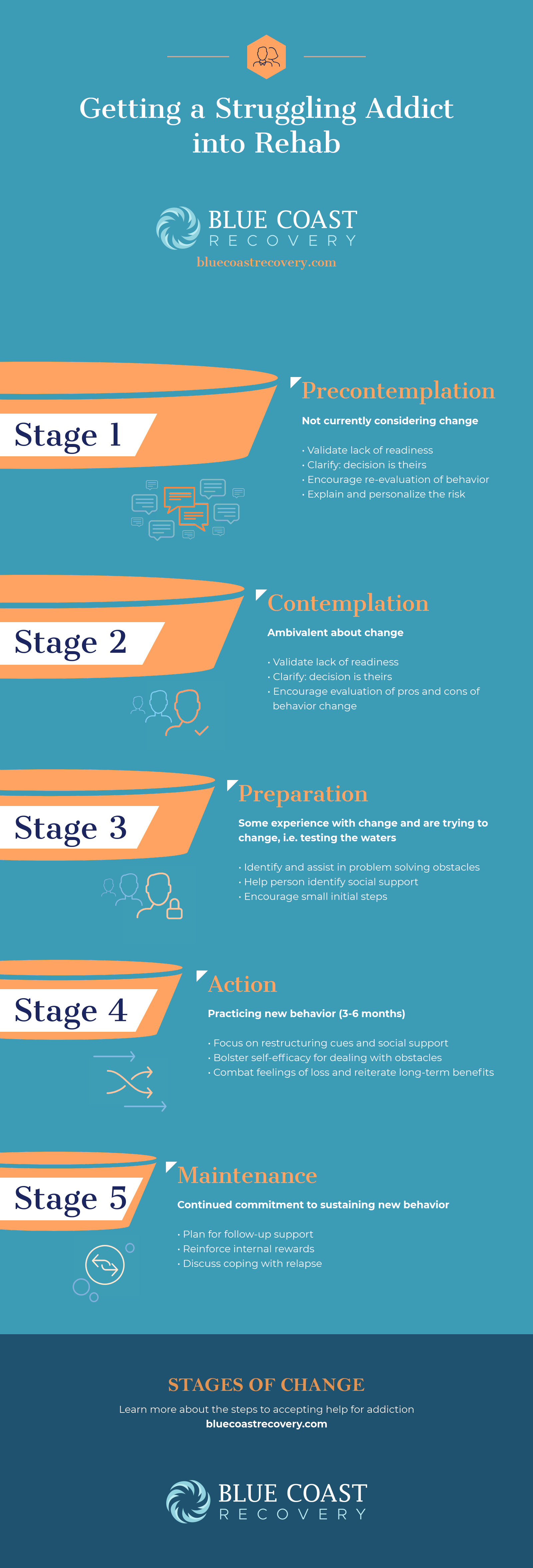It’s overwhelming to try and convince a person who doesn’t want help that they do, in fact, need it desperately. People suffering in their active addiction often utilize mental barriers which prevent them from making a change. Contrary to popular belief, many addicts actually do harbor some kind of understanding that their behaviors are destructive. So why can’t they act on this understanding? Why do they continue to refuse help?
Understanding Stages of Change
The simple answer is that recovery only begins after an important psychological process occurs. This is known in the treatment world as the “stages of change.” Active addicts must travel through these stages of change on their own terms. The unfortunate news for loved ones is that they cannot force this process to happen. But there are recommended approaches that tend to be more effective for encouraging active addicts in denial. They are often subtle and require a level of empathy for the struggling addict.
Stage 1: Precontemplation
Also known as active addiction. This person is not considering change.
To approach a person in the precontemplation stage, you should first of all validate their lack of readiness. It does no good to try shaming people who are suffering from a disease. Back away a bit to say, “Hey, I understand why you’re not interested in treatment right now.” This helps to take them off the defensive right off the bat.
It sucks for loved ones to hear, but the only way active addicts get started on their recovery is to make the decision to get clean and sober themselves. So clarify that the choice is with them, and that you are just offering your perspective as someone who cares. Encourage your loved one to re-evaluate their behavior and encourage self-exploration rather than action. You can also explain the risks associated with continuing on their current track, and it can help to personalize this risk. Be wary of laying a guilt trip, though, as this may have the opposite effect.
Stage 2: Contemplation
Ambivalent about change. They are going back and forth about whether their habit is a problem.
Although stage two is a step closer toward accepting help than stage one, addicts in contemplation mode still need to have their lack of readiness validated. They still benefit from reminders that the decision is theirs. This puts them in a position of control as they decide for themselves whether they are ready.
The difference is that the person is now considering the possibility of change. They haven’t committed to it or even acknowledged it as the ideal choice. It is simply on the table at this point, which is certainly a step forward from stage one. In this stage, loved ones benefit from encouraging an evaluation of pros and cons. This goes a bit deeper than just looking at behaviors overall because it’s asking them to assign value judgments. So once they have accepted the possibility of change, it’s time to identify and promote new, positive outcomes (i.e. going to treatment and the benefits that has long term).
Stage 3: Preparation
Also known as testing the waters. They are evaluating their previous experiences with change and are trying to change.
In the preparation stage, people have made some level of commitment to making a change. They acknowledge their problem and seek out information about how best to address it. You may hear them say things like, “Something has to change. What can I do?” This is when they usually start reaching out to treatment centers. They’ll gather information about what their options are and the logistics of getting help.
People too often skip this stage and run right from contemplation to action. This often leads to disappointment as the person has not fully made a committed decision to change. So while it can be nerve-wracking to see loved ones “stalling” in the preparation stage, it’s often a necessary step to make a permanent change.
Stage 4: Action/Willpower
Practicing new behavior for 3-6 months.
This is the stage where people believe they have the ability to change and are actively working on changing their behaviors. It usually takes the form of inpatient rehab at a treatment center. This is a place where they can focus on their recovery for a relatively short but intensive time as they learn tools for a new lifestyle.
This is typically the shortest of all the stages. It typically lasts about six months but can be much shorter. As people depend on their willpower in this stage, it has the highest likelihood of relapse as well.
Stage 5: Maintenance
Continued commitment to new lifestyle with sustained behaviors.
Ideally, the maintenance phase lasts indefinitely. This signifies a true lifestyle shift as people maintain their new learned behaviors. People in maintenance mode constantly evaluate the rules of their lives and make adjustments to deal with life while avoiding relapse. A certain level of self-acceptance is required as people resist temptation and stay on the clean and sober track.
Stage 6: Relapse
Might be a single incidence, or lead back to active addiction.
Unfortunately maintenance does not always last indefinitely. Many addicts do fall victim to relapse, which is categorized as phase 6. These incidents should be evaluated carefully and addressed by moving back a few steps to get behaviors back where they need to be.



